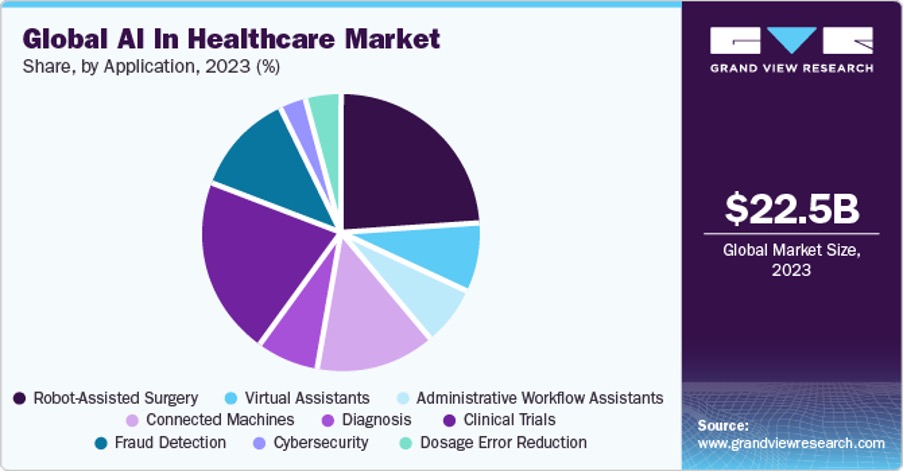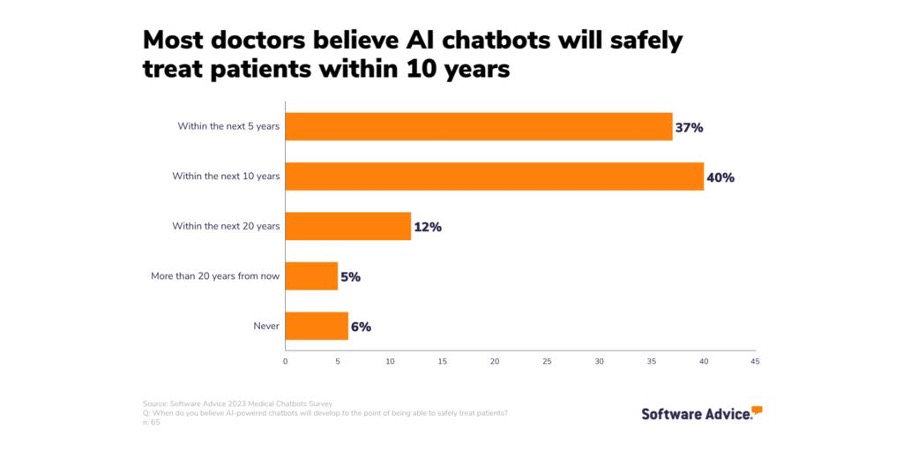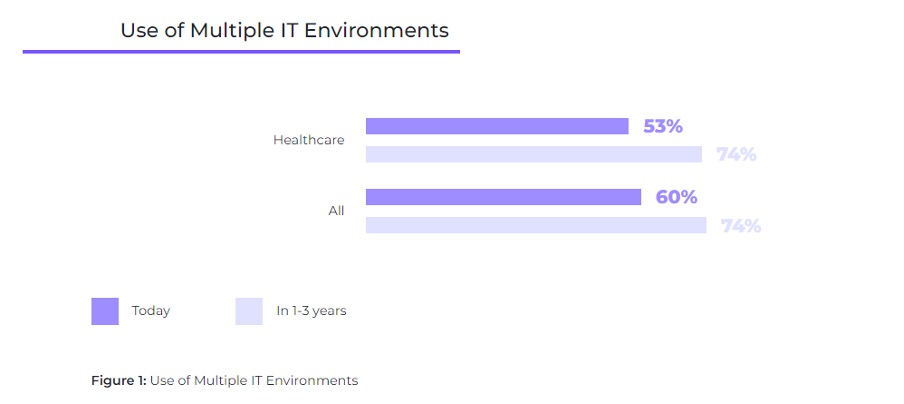The year 2024 is positioned to be a pivotal one in the world of healthcare AI, marked by a shift from experimental AI applications to the incorporation of AI as a core part of operations, strategy, and care delivery.
“Most healthcare organizations would love to have all of the super sophisticated AI tools,” said Leah Gabbert, Marketing Director of Global Industry Solutions at Nutanix, who has worked in the healthcare industry for more than two decades.
“But the reality is that most healthcare organizations don’t have the specialized staff, resources or processes needed to leverage AI for personalized medical care right now,” said Gabbert.
Gabbert sees a few key aspects pulling AI into healthcare providers.
“First, consumer-driven healthcare demands. Consumers expect a personal and sophisticated patient experience, and now they have access to myriad information that allows them to make proactive decisions about where they receive their care,” she said
“Second, healthcare organizations recognizing the need to streamline their business to be more efficient but also to attract the very best clinicians and healthcare workers.”
From an operational perspective, AI is playing a role in everything from automated schedule optimization to advanced natural language processing (NLP) analysis used to detect signs of staff burnout to data analytics that can detect potential fraud.
At the same time, care delivery is being transformed by novel capabilities, like AI-powered robots that enhance surgical precision, to sophisticated data analytics for more accurate (and even predictive diagnostics), and the ability to quickly recognize emerging public health trends at an organizational, community, regional, or wider level.
Conversational AI tools, like virtual assistants or chatbots, are achieving greater sophistication in answering patient questions and inquiries, providing faster responses while alleviating the time burden associated with responding to inquiries. As a result, physicians and other care providers can allocate more time and energy to patients in the most serious need.
In short: AI is emerging from the periphery of the healthcare sector towards the heart of modern healthcare operations and care delivery. In fact, a recent Morgan Stanley survey found that AI is becoming ubiquitous in healthcare – 94% of organizations say they use AI and ML in some capacity.
Separate research from Grandview highlights the diversity of healthcare AI applications, which shows a strong balance of focus across operations, diagnostics, treatment, and research.
Ronen Lavi, CEO of AI-powered primary care platform Navina, called AI in healthcare “the new normal,” and emphasized how industry-wide understanding has grown:
“In 2023,” Lavi shared, “clinical and healthcare IT leaders witnessed an unprecedented number of creative examples for how to incorporate AI into clinical and administrative workflows. However, a year in, these leaders have grown more sophisticated and have developed a deeper understanding of what AI can and cannot do for their organizations.”
According to Lavi, the shift we’re experiencing is toward a more “meaningful use” of AI rather than incorporating a range of AI technologies just for the sake of keeping up. Healthcare leaders are building real, unique strategies for AI to align with their needs, goals, and current systems.
Healthcare AI as an Efficiency Driver
AI is driving efficiency in diverse and dynamic ways across the healthcare sector – ways that are directly impacting the employee and patient experience alike. Scheduling matrixes can be optimized using AI-powered predictive analytics tools that forecast appointment demand, hospital occupancy rates, staff callouts, and more.
Schedules can then be proactively designed to balance staff-to-patient ratios and reduce issues like long wait times or overcrowding.
Providence Health System developed their own AI algorithm to make their staff scheduling more flexible. Providence Senior Manager, Natalie Edgeworth, presented on it at the 2023 Healthcare Information Management Systems Society (HIMSS) meeting.
“With the workforce crisis situation everyone is experiencing, we are having a hard time managing our resources to the most optimal level,” she explained.
“So this tool we built takes a look at the electronic medical record and billing data to forecast both volume and acuity to be able to assign people to the right places at the right times.”
AI is also streamlining healthcare data management, breaking down silos to analyze data from a variety of sources, including EHRs and patient-generated data from wearables. This automated and comprehensive data analysis helps to shorten time to diagnosis and provides a 360-degree view for better diagnostic accuracy.
At the same time, generative AI (GenAI) tools are taking these newly-streamlined datasets and using them to generate documents and respond to provider inquiries with ready-made insights.
“Disparate sources of unstructured data, which abound in healthcare, are now assets to power generative AI,” McKinsey experts reported in their recent article on the technology.
They continued: “GenAI can automatically and immediately summarize this data regardless of the volume, freeing up time for people to address more complex needs.”
Conversational AI tools are rapidly expanding the scale at which providers are able to respond to patient inquiries. Many providers can now offer immediate responses 24/7 to alleviate patient stress and point them toward the right next steps without the need for further assistance.
This reduces the number of routine inquiries staff have to handle, allowing them in turn to focus on patients with more critical needs and activities related to direct care.
While there are understandable reservations around a chatbot’s ability to accurately guide patients on real healthcare concerns, most physicians are showing trust in the technology as it becomes more advanced.
Today, more than three-quarters of doctors believe AI chatbots will safely treat patients within the next 10 years (37% say it will happen in five). This indicates that chatbots not only alleviate the burden of initial inquiries, but will eventually provide more nuanced expert advice.
AI in healthcare – once primarily thought to be an efficiency driver – is also becoming a critical part of care delivery. In the next section, we’ll explore some of the most transformative ways AI already plays a role in modern patient care.
Powering Cutting-Edge Capabilities to Transform Patient Care
The impact of AI in empowering better, more advanced care is undeniable, and it’s happening in a myriad of ways across the healthcare sector. Personalization is one of the most deeply-felt AI enhancements for providers and patients alike. AI’s ability to mine data from multiple sources is giving providers more complete and immediate insight into patients’ history and needs.
This holistic understanding of each patient as an individual enables treatment plans that won’t only have high efficacy as it relates to health conditions, but will align with patient behaviors to increase the likelihood of adherence.
For example, AI algorithms can identify future health risks based on a patient's unique data profile and past behaviors as they’re reported in medical history documents (ex: failure to stick to medication schedule), so providers can find better strategies to achieve desired outcomes.
AI is also shifting diagnostics from reactive to predictive models, particularly for patients who deal with recurrent or chronic conditions, or who are otherwise at high risk of having a particular health event occur (ex: genetic predisposal).
One recent study in Mexico developed an AI model that predicted the likelihood of gestational diabetes (GDM) occurring in pregnant women with high accuracy (70%) and sensitivity (80%).
The implications are significant – preventing GDM (rather than treating it after it occurs) has a direct impact on the woman’s overall pregnancy health and that of her baby in utero.
“This [is] an opportunity to offer personalized strategies to prevent the development of diabetes in pregnancy,” shared the study’s researchers.
“Using MIDO GDM [the model developed during the study], pregnant women at risk of developing GDM can be identified in the first trimester of pregnancy with a group of easy-to-obtain variables.”
“It would be possible to establish the risk of developing GDM in the early stages of pregnancy and to promote personalized preventive actions and appropriate treatment in a timely manner.
In surgical procedures, AI-enhanced robotics is playing a crucial role. These robotic systems assist surgeons in performing complex surgeries with greater precision and control, leading to better patient outcomes and quicker recovery times.
The precision offered by AI-driven surgical robots means less invasive procedures and reduced risk of complications overall.
Finally, the rise of AI wearables has enabled continuous monitoring and data analysis that can improve patient care. Wearable devices collect a wealth of data in real-time, which AI systems analyze to provide insights into a patient's health status.
This constant monitoring allows for early detection of potential health issues and more proactive healthcare management. For instance, AI wearables are being used to monitor patients with chronic conditions, providing healthcare providers with valuable data to adjust treatment plans as needed.
Managing AI Healthcare Tech: The Role of Hybrid Multicloud
For healthcare organizations implementing AI systems, foundational questions arise about how to manage them. With diverse sets of AI applications powering a range of capabilities, the need for a centralized, scalable, flexible, and secure environment to house them is critical.
Hybrid multicloud has emerged as the optimal solution. A blend of on-premise, private cloud, and public cloud environments give organizations the flexibility to place AI applications and data in the most appropriate computing environment while maintaining a connected infrastructure.
For example: Sensitive patient data can be kept on-premises or in a private cloud to comply with privacy regulations, while computationally intensive AI tasks, such as large-scale data analysis or training machine learning models, can leverage the vast resources of public clouds.
As healthcare organizations' data needs grow, especially with the increasing use of AI and big data analytics, the hybrid multicloud model enables healthcare providers to expand their storage and computing capabilities without significant upfront investments in physical infrastructure.
They can also tailor their IT environments to the specific needs of different AI applications. For example, they can use cloud-based services for rapidly deploying and testing new AI tools, then seamlessly integrate these tools into their existing on-premises systems.
By using a combination of private and public clouds, organizations can be better prepared to onboard AI applications and manage data. According to the 2023 Nutanix Enterprise Cloud Index for Healthcare (ECI), adoption rates for hybrid multicloud solutions in healthcare lags behind global averages, but is set to catch up in the next 1-3 years, reaching 74%.
Forward-thinking organizations are taking their hybrid multicloud strategies a step further by adopting singular platforms on which they can view and manage public, private, and on-premise environments. This type of solution is “ideal” for 96% of ECI respondents.
A separate but equally critical component of managing healthcare AI is the vetting of models and applications being delivered to researchers and clinicians for real-world use. This endeavor is happening at the industry level.
One notable example is MedPerf, an open-source platform developed by the likes of Google, Microsoft, Dell, and Intel, that accelerates the readiness of AI and ML models in healthcare.
“MedPerf evaluates medical AI models on diverse, real-world data,” said Alexandros Karargyris, researcher who helped pioneer the MedPerf platform, in an interview with The Forecast by Nutanix.
As a result, MedPerf is able to quantify the performance of AI models without compromising the privacy or security of actual patient data. This is a huge stride in addressing common concerns about both data privacy and the reliability of AI technologies, especially in critical scenarios like those seen across the healthcare space.
Looking Ahead
As healthcare uses for AI become more defined and proven – for example, to speed business processes or sifting through medical documentation – it could bring noticeable benefits to providers and patients, said Nutanix’s Gabbert.
“Being able to simplify and expedite processes will help not only the organization, but will also help expedite the right care for the patient,” she said.
But she points out that healthcare has very personal aspect that require privacy and special attention.
“In the business world, we talk about aspects as being ‘business critical,’” she said. “But when we talk about healthcare, I’d argue that it’s not ‘business critical’ at all. It’s ‘life critical.’ We’re not talking about innocuous data points. Every data point on your list is a real person with a real medical need, and a decision can mean life or death to them.”
Editor’s note: Explore how Nutanix software enables healthcare organizations to simplify IT operations and focus on delivering better patient outcomes and clinician productivity. And learn more about the Nutanix platform for AI, including Nutanix GPT-in-a-Box, a full-stack software-defined AI-ready platform designed to simplify and jump-start your initiatives from edge to core.
Michael Brenner is a keynote speaker, author and CEO of Marketing Insider Group. Michael has written hundreds of articles on sites such as Forbes, Entrepreneur Magazine, and The Guardian and he speaks at dozens of leadership conferences each year covering topics such as marketing, leadership, technology, and business strategy.
© 2024 Nutanix, Inc. All rights reserved. For additional legal information, please go here.










